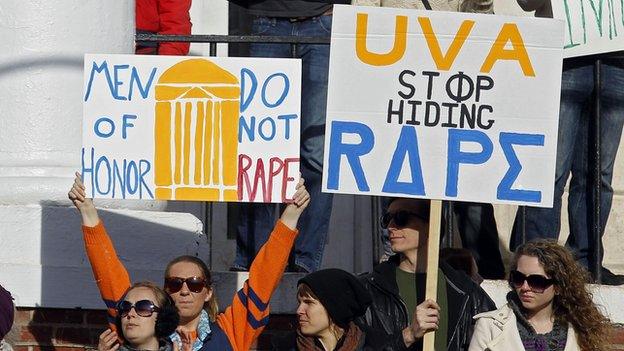#BBCtrending: #IStandWithJackie v #UVARapeHoax
- Published
.jpg)
It was probably only a matter of time before people on social media began speculating as to the identity of the woman at the centre of the University of Virginia rape controversy.
There were just too many details in the Rolling Stone, external magazine article about "Jackie" - the woman who alleges she was sexually assaulted by a group of classmates at a fraternity house - and the story was too explosive for her to remain anonymous.
As multiple, external reports, external from the Washington Post show flaws in the Rolling Stone story, the outcry from those who feel the story epitomises trumped-up charges against men and fraternity culture has grown - while those who feel rape is not taken seriously enough have doubled down.
Now Chuck Johnson, a muckraking writer with a controversial past, external, says he's identified the woman and is broadcasting the fact on his website and via Twitter.
The woman's name became a Twitter hashtag, mentioned over 2,000 times, along with hashtag #UVAhoax, which garnered more than 6,000 uses.
According to an analytical review, 70% of users posting her name or the hashtags are men.
By contrast, 59% of the 11,000 Twitter users posting #IstandwithJackie are women.
The gulf represents a larger online division in the wake of the Rolling Stone story.
The article initially prompted near-universal condemnation of the university and the fraternity in question, prompting school administrators to suspend all fraternity and sorority activities until mid-January.
In the ensuing weeks, however, journalists began finding discrepancies in Jackie's account of her attack, raising questions about the magazine's reporting and fact checking. Rolling Stone backed away from portions of the story and issued an apology to its readers, external.
The public debate grew heated.
Opponents latched onto the retreat as evidence of an anti-male agenda, and said the woman deserved to be exposed for her misleading statements.
Johnson told the Washington Post, external naming the woman was part of a larger quest to repair damage done by the story. "I want Jackie to get psychological help. I want all the fraternities, suspended under these dubious stories, to be reinstated," he said.
Supporters said inconsistent statements were not uncommon for victims of sexual assault. Nor was it uncommon for these women to be discredited and disparaged for speaking out.
"[I]t is these common, understandable discrepancies that are being used to threaten a now famous-against-her-will young woman," writes Katie Klabusich in Buzzfeed, external.
Slate's Hanna Rosin says, external the real blame for Jackie's exposure rests with Rolling Stone.
"Thanks to Rolling Stone, the case is being adjudicated by reporters and bloggers and internet trolls who range in type from the responsible to the opportunistic to the despicable," she writes.
More than just Rolling Stone's integrity is being questioned, however.
Caitlin Dewey of the Washington Post says, external this latest episode reveals a larger truth about the state of today's internet. It's the latest piece of evidence - from pick-up artists to Gamergate - that social media is descending into a swamp of sexism and rage.
"As a medium, the internet favours the brief, the inflammatory and the outrage-inducing over the nuanced or the thoughtfully considered," she writes.
Reporting by Anthony Zurcher, external
You can follow BBC Trending on Twitter @BBCtrending
All our stories are at bbc.com/trending
- Published5 December 2014
.jpg)
- Published25 November 2014

- Published21 March 2014
.jpg)